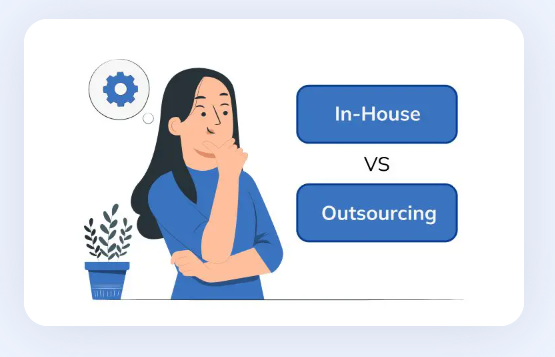In today's fast-paced business landscape, the choice between in-house operations and outsourcing is a critical decision that can significantly impact a company's success. Both approaches have their merits and drawbacks, and making the right choice is crucial for long-term growth and sustainability.
The Power of In-House Operations
Control and Expertise
When a company decides to handle its operations in-house, it retains full control over every aspect of its business processes. This control allows for greater flexibility and customization, as well as the ability to adapt quickly to changing market conditions. In-house teams can develop a deep understanding of the company's unique needs and challenges, leading to specialized expertise.
Communication and Team Cohesion
Having teams working under the same roof fosters direct communication and collaboration. This proximity often leads to better team cohesion, as employees can interact regularly, share ideas, and solve problems more effectively. The synergy that emerges from in-house teams can drive innovation and creativity.
Data Security and Confidentiality
For businesses dealing with sensitive data or confidential information, in-house operations provide a higher level of security. With strict access controls and data protection measures in place, companies can safeguard their proprietary information more effectively.
The Benefits of Outsourcing
Cost Efficiency
Outsourcing certain functions or processes can be a cost-effective strategy for businesses looking to reduce overhead expenses. By partnering with specialized service providers, companies can access high-quality services without the need for substantial in-house investments.
Scalability and Flexibility
Outsourcing offers the advantage of scalability. As a business grows, it can easily expand its outsourced services to match the increasing demands. This flexibility allows companies to remain agile and responsive to market fluctuations.
Access to Global Talent
Outsourcing opens the door to a global talent pool. Companies can tap into the expertise of professionals from around the world, ensuring access to diverse skill sets and fresh perspectives. This can be especially valuable for businesses looking to stay competitive in a rapidly evolving landscape.
Making the Choice
In the end, the decision between in-house vs outsourcing should be based on a careful evaluation of your company's specific needs and goals. There is no one-size-fits-all solution, as what works best for one business may not work for another.
Consider factors such as the nature of your industry, the level of control you require, your budget, and your long-term objectives. It's also essential to keep in mind that hybrid models, where some functions are kept in-house while others are outsourced, can offer a balanced approach.
In conclusion, the choice between in-house operations and outsourcing is a critical strategic decision that requires careful consideration. By weighing the pros and cons of each approach and aligning them with your business objectives, you can make an informed choice that maximizes efficiency and profits for your company.
